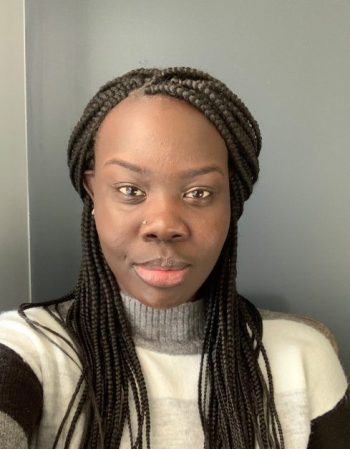
What role does pharmacy play in healthcare access for refugee families?
Concordia University School of Pharmacy student Apiew Ojulu recently presented on this topic at the Our City of Nations conference (OCON). OCON is a multidisciplinary conference organized by a group of stakeholders interested and committed in making a more welcoming and equitable community for all. Ojulu responded to some questions about her presentation below.
What was the topic of your presentation?
The topic of the OCON presentation was “Caring for Refugee Patients: Cultural Humility, Clinical Considerations, and Local Resources.”
Why did you choose this topic?
As a former refugee myself, I thought it was an important for healthcare professionals to hear about the experiences that refugees and immigrants have encountered upon entering a new country. Topics of discussions included stories of getting to refugee camps, medical screenings before and upon arrival to their destination, and how newcomers become acquainted to the healthcare system.
Secondly, there are clinical considerations that can be taken based off the part of the world a patient may come from; considerations may be seen from an infectious disease standpoint or even cultural considerations that may be attributed to certain acute/chronic medical conditions.
How can pharmacists help connect refugee families to healthcare?
Pharmacists are among the most accessible of health care professionals in the United States and can aid as a resource for the access to healthcare more than simply providing medications. Upon arriving to the U.S., individuals may not have a primary care provider right away.
What does this involvement look like?
Notable areas for pharmacist involvement include immunization to address vaccine-preventable diseases, screenings, and education on vital medications to control chronic conditions and treat acute conditions. Overall, it important for any pharmacist to be cognizant of the unique needs of different groups, to strive to overcome cultural and language barriers, and to consider the unique conceptions of one’s own definition of personal wellbeing.
How has your life experience helped you understand the healthcare challenges immigrant families face?
Having lived through it on both sides as a refugee and now a future healthcare professional, it has given me the ability to understand the fear or intimidation a new immigrant or refugee may experience when encountering the healthcare system. Through my own personal experience, it has really taught me how vital patience and trust is when building that rapport with every individual you encounter.
How has your coursework helped you with how pharmacy can impact refugee healthcare?
One specific course in which we touched on this topic was Applied Patient Care during my P3 year. We read Annie Fadiman’s The Spirit Catches You and You Fall Down, which tells the story of a Hmong child with epilepsy that reveals the risks of a lack of cross-cultural communication in healthcare.
At the end of the semester, we had the opportunity to discuss our thoughts on how to handle certain situations from the book as a class. It’s one thing to read about it, it’s another to actually be able to discuss some of those barriers with your peers and learning how others would approach those circumstances.
Why do you want to be a pharmacist?
From a young age, I knew that I wanted to be in healthcare when I lost my twin sister to malaria and a medication error in Ethiopia. I developed a strong interest in pharmaceuticals, medication safety, and the lack of basic healthcare for the general public in areas of East Africa. These examples are only a small area to which a pharmacist can make an impact. Although my interests were sparked by global health issues, it struck me how even people here within the United States are unable to have effective healthcare; whose situation resembles those of my community in Ethiopia.
How did you know pharmacy was the right path for you?
Pharmacists have the ability to wear different hats and specialize in a vast number of areas. I knew pharmacy was right for me as I have a passion for medicine and knew I could have the opportunity to make an impact on a patient’s care. Pairing this with desire to become a leader on a larger scale in the healthcare system, made being a pharmacist the path for me.
Want to learn more?
- Click here to learn more about the refugee resettling process in Milwaukee, WI.
- Click here to explore the student experience offered at Concordia University Wisconsin School of Pharmacy.
This post was originally published on December 23, 2020. It has been updated to reflect current information.
—
If this story has inspired you, why not explore how you can help further Concordia's mission through giving.